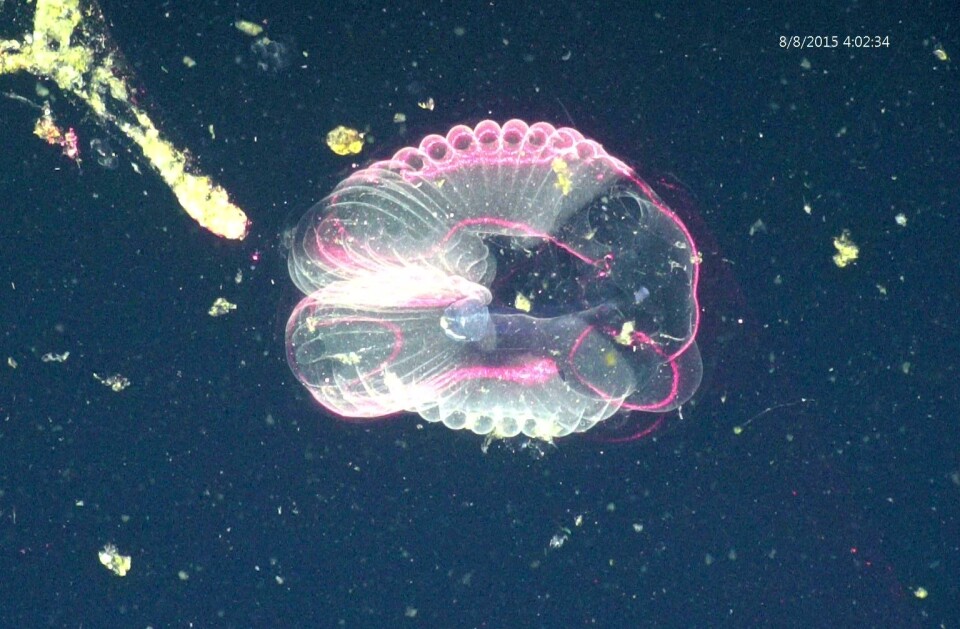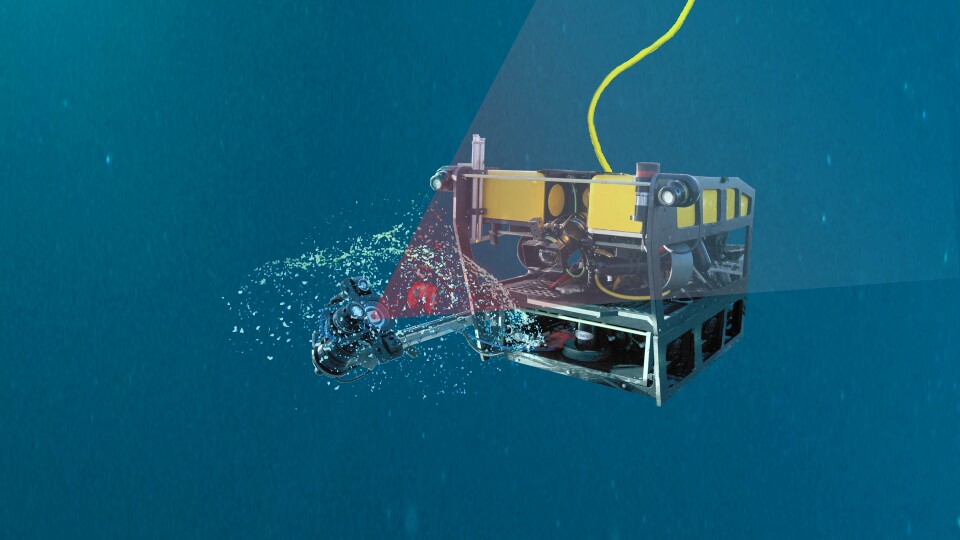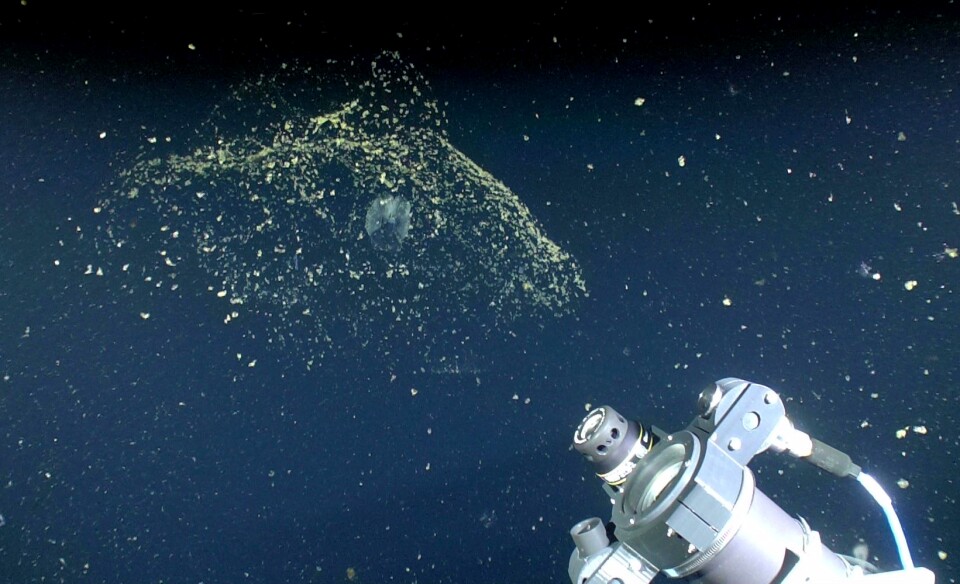CA lawmakers react to FBI Director Comey's sudden firing, LAUSD considers creating student savings accounts, giant zooplankton's role in Earth's carbon cycle.
California lawmakers react to Comey firing
California's Democratic lawmakers were quick to criticize the firing of FBI Director James Comey.
The Republicans?
"Crickets," says KQED's Scott Shafer.
Press the blue play button above to hear more.
California lawmakers spoke to Take Two Wednesday. Click here read about it.
Democrats are demanding a special prosecutor on Russia. What does that mean?
Tuesday's announcement that President Trump had fired FBI Director James Comey appeared to take lawmakers of both parties off guard.
The axe dropped during a federal investigation into Russian meddling in the 2016 election, including a probe of possible ties between Donald Trump's campaign and Russian operatives.
Democrats are now raising the volume on calls for the appointment of an independent prosecutor.
Critics of the Comey firing are asking: How will the investigation proceed without the FBI director, and can the American people expect it to be truly independent?
Professor Laura Donahue with Georgetown Law joined A Martinez to explain the legal possibilities ahead for the Russia investigation. Donahue is Director of the Center on National Security and the Law.
Some lawmakers are calling for a "special prosecutor" and others are saying we need a "special counsel." Are we talking about the same thing?
No, in short. There is no special prosecutor position right now. Previously there was something called an independent counsel that was in the Ethics in Government Act introduced, as many listeners will remember, from the Saturday Night Massacre that President Nixon orchestrated.
Congress stepped up and said 'we need to have somebody who is independent.' They set up an elaborate system where you had a special panel of judges who would then appoint a prosecutor, and the prosecutor was largely immune from any political interference.
The Supreme Court found it was constitutional for them to do that in a case called US vs. Nixon. But it turned out it was dangerous to have a prosecutor kind of running amuck, without any sort of check on that authority.
So in 1999, Congress let that power expire. So what we're talking about now is called a special counsel, which is a position provided for in the Code of Federal Regulations.
A special counsel would be appointed by the Attorney General. Of course in this case, it wouldn't be Jeff Sessions who could do this, because he's had to recuse himself from all matters related to the Russia probe. Instead it would be done by the Deputy Attorney General, and that individual would have the authority to look into the situation.
Would this person be independent of the President's authority? Could President Trump fire them?
The Attorney General, and in this case the Deputy AG, would be able to fire this person, yes.
There are certain conditions on appointing somebody. A criminal investigation has to be warranted, the Department of Justice has to somehow have a conflict of interest or there has to be another extraordinary circumstance, or it has to be in the public interest.
The decision--whether or not to appoint somebody and who is appointed--that is not reviewable by any court. That's entirely in the domain of the Attorney General.
What about the House and Senate investigations, how are they different from the FBI or a special counsel's?
An FBI investigation is going to be a traditional, ordinary criminal investigation where there's a preliminary investigation and then a full investigation. That's what's under way currently, and that's why there's been such a political firestorm about removing director Comey from the position.
The special counsel essentially has all the authorities of a U.S. Attorney, in addition they have additional resources made available to them, and the AG can set the jurisdiction for that person in the special counsel position.
Now, if Congress were to act--there has already been broad bipartisan support--you have Senator McCain and Representative Justin Amash all calling for a new special committee to be set up, like the Church Committee was set up. In that case the only thing that such a committee could do would be to subpoena individuals and then issue a report.
That's very different from giving someone who is familiar with the inner workings of the Justice Department and acting in a prosecutorial capacity the ability to look at all of the classified materials and the ability to bring criminal charges after the fact. It's a very different function.
Just to be clear: The House and Senate, as far as they can go is to issue a report, and that's where it stops?
Pretty much, yes. There are further steps they can take if they want to remove the President from office. But that's a constitutional matter, not for the committee to decide. The committee can only subpoena individuals and then issue a report.
Will the firing of the FBI director knock the Russia investigation off track?
It's not clear what's going to happen actually inside the FBI in terms of the investigation itself, and how insulated it was or was not from the director's position.
CNN is reporting that before Comey's firing, federal prosecutors had just issued grand jury subpoenas to associates of former National Security Advisor Michael Flynn. What does that tell you about the status of this investigation?
That it's heating up. It's a pretty serious investigation that's underway, which is again why I think you see such a political backlash to this right now... This is deeply concerning, the level to which Russian ties appear to keep coming to the surface.
The interview has been edited for clarity. To hear the full conversation, click on the blue media player at the top of the page.
LA City Council considers savings accounts for kindergartners
Here's something that should make the first day of kindergarten even more exciting:
A free, $50 savings account for every child that enrolls. The LA City Council has been wanting to try it out for a while, and this week they got an estimate of the cost--an estimated $3 million a year.
But why put $50 in a bank account for a 5 year-old?
Our education editor Maura Walz came by to enlighten us.
Why give a kid 50 bucks?
"The idea is pretty simple: To help remove some of the barriers to college by helping families to start saving really early, and by making it easier to do that, especially for low-income families.
The backers of this plan like to cite research from Washington University in St. Louis that found that low to moderate income students were something like three times more likely to enroll in college just by having a college savings account, even if there wasn't that much money in it. Just the mere existence of that college savings account made them much more likely to enroll in college, it made them much more likely to finish.
So, that's sort of the idea. It's to get them saving early, make it easier to do it. Also, to teach financial literacy skills. It's sort of trying to set kids on that path and establish a college-going goal, really really early."
Has this been tried anywhere else before?
"San Francisco was the first city to do this. They started a program that's similar to the one that L.A. City Council and L.A. Unified School District officials are talking about. They started that in 2011 and then there have been a couple of other cities that the city council analysis cited that are doing various versions: St. Louis, Boston, Oakland, New York City... Those have started in the past year or two. It's a pretty new idea, at least in the United States."
What about money details? When does the child get access?
"We're still in the research phase. LA Unified officials are looking at it. LA City Council officials are looking at it. But we can look at what has happened in San Francisco. So, every child in the San Francisco Unified School District gets $50 to start. Low-income kids get $100. It's very easy to deposit money. You can go to a bank branch, you can mail it in, you can set up an automatic deposit and there's actually private funders there who are contributing to some incentives to save even more.
So, they've got like a dollar for dollar match for up to $100 and then there's another incentive where they get an extra $100 if they enroll in an automatic deposit program. So, there's this idea that if you make it really easy and you give some incentive that people will really participate."
To listen to the full segment, click the blue play button above.
State Senator Tony Mendoza on why he wants to increase the number of county supervisors
There are ten million people in LA County and all of them are represented by the 5 elected officials who make up the board of supervisors.
Some say there aren't enough supervisors to represent that many people and others add that the large districts make it harder for people of color to win election to the board.
State Senator Tony Mendoza is making a case for increasing the number of supervisors on county boards so that each official would represent no more than 1.4 million people per district.
To accomplish this, he's purposing an amendment to the state constitution. But for an amendment to be officially adopted, it must first pass through the state legislature, and then approved by voters on a state-wide ballot.
For us in Los Angeles County, that would mean adding two new districts and two new seats to board of supervisors.
Opponents like LA Supervisor Sheila Kuehl argue that local issues shouldn't be left up to voters outside of Los Angeles, and should only be determined by those directly affected by those issues.
Senator Mendoza spoke with Take Two's A Martinez and explained why he wants to increase representation for California counties.
To listen to the interview with Senator Mendoza, click on the blue Media Player above.
K2 Sports: Yawn-worthy NBA finals or drama on the court?
It's looking like the Golden State Warriors and the Cleveland Cavaliers may play each other in the upcoming NBA finals... Yet again.
The teams competed the last two years and each has won a championship.
It's a bit of a throwback to the 1980s, when the Lakers and Celtics battled for the title three times.
But this is a new era and people have different viewing tastes. So, if the Warriors and the Cavaliers do meet again, will it be exciting or ho-hum for viewers?
For that and more from the wide, wide world of sports, the "K2 Brothers," Andy and Brian Kamenetzky joined Take Two's A Martinez.
Interview Highlight
It would be the first time in NBA history that the same teams met in the finals three straight years. The problem has been the lead up where the Cavs and the Warriors have swept their opening two rounds and have not looked particularly challenged along the way. You want drama, and excitements, and a hard road to presumed glory. It also doesn't help that the playoffs in general have been oddly flat. There have been just a ton of blowout games in the first, and especially, the second rounds. There just hasn't been much excitement. Like last night, the Spurs beat the Rockets in game 5 of their series in a tight contest that went into overtime. I think if we saw more of those games, it would affect the general perception of the playoffs in a positive way.
*Quotes edited for clarity*
To hear the whole conversation with Andy and Brian Kamenetzky, click on the blue Media Player above.
Giant zooplankton: Nature's water filtering, carbon storing enigma
A key component to understanding climate change may be within some unusual ocean-dwelling critters.
Giant zooplankton known as Larvaceans are the subject of a unique study published recently in the journal Science Advances. Thanks to new technology that was developed in order to observe the gelatinous, transparent animals, scientists have been able to see how Larvaceans feed in their natural habitat.
It turns out whenever Larvaceans feed, they create mucus structures known as "houses"--since they also happen to live in them. Their houses help them filter out all the organic material to eat while pushing aside the rest, mainly carbon. Once the houses are all blocked up, the Larvaceans abandon them. The discarded houses then fall to ocean floor, trapping all the carbon with them.
This relationship between Larvaceans and carbon appears to be a missing piece in the puzzle to understand how carbon cycles through the Earth. It also gives us some insights into how the planet moves carbon from air to sea, and how it could potentially help us address the impacts of climate change.
https://www.youtube.com/watch?v=L1wFb_ShW7k
Take Two's A Matinez spoke with the study's lead author, Kakani Katija. She's principle engineer at the Monterey Bay Aquarium Research Institute.
GIANT ZOOPLANKTON... Actually not so giant. More like finger sized.

It's actually called that [Larvacean] because it looks a lot like a larvae. You can also think about a tadpole. Essentially, they only have a head and a tail.
They're fully transparent, their tissues are gelatinous, so you can see right through them. That's one of the reasons why we don't know much about them. Anything that's gelatinous will just appear like a pile of nothing.
They're not just hungry, they're nature's water filter.

They're able to generate a house made of mucus that's actually a really complex structure that serves as a filter. This animal is then able to push fluid through this filter by moving its tail... That separates food particles like organic carbon, and dead animals from the water around it.
Small critters with a big role in the global carbon cycle
These houses also play an important role in cycling carbon in our oceans.... There's this process whereby organisms are able to play a role in moving carbon and CO2 that's in the atmosphere and through the oceans, and ultimately some of that reaches the bottom of the ocean and is sequestered.
So, the more carbon that you can transport and get to stay on the bottom of the ocean, the better it is for minimizing the impacts of ocean acidification and climate change.
Problems keeping an eye on underwater see-through animals? Turn to robots and lasers, of course!


We were using remotely operated vehicles. We also developed instrumentation that allowed us to measure directly what the filtration rates are of these organisms are. That instrument is called a DeepPIV and is made up of a camera, a laser and some optics. That allows us to take a single laser beam... And then shine that beam through some optics to create a thin sheet of light. So, you can see the interior structures of the house as well as how water moves through it.
https://www.youtube.com/watch?v=0fCnHyxYVMw
There are a lot of questions we're hoping to address thanks to the development of this new instrumentation.
Tempting it may be, but playing with nature isn't the answer.
Larvaceans play a really important role in carbon cycling, maybe we'd want to do something to promote their numbers or increase their abundance.... However, whenever you mess with an ecosystem that's in a delicate balance, you might have these unintended consequences where we don't know what will happen.
But we may be able to duplicate what Larvaceans do for our own purposes.
The first step is figure out how the system functions--how the organism functions. The next question is, if they're doing something that's special, is that something we can reverse engineer and use for another application?
*Quotes edited for clarity*




